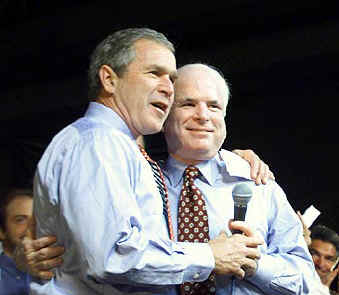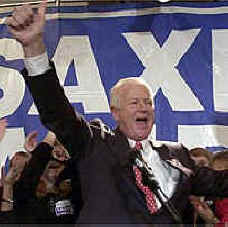Editor’s Note: What happens to politicians who have the courage to tell the American people inconvenient or unpleasant truths? They end up unemployed, wondering how they managed to lose elections to guys who couldn’t tell the truth if you held a gun to their heads. Bravery and honesty are rare in politics for good reason — neither will get you elected.
Politics: Not a Profession for the Brave of Heart
|
In Mel Gibson’s “Braveheart,” one of the most inspiring movies ever filmed, William Wallace advised Robert the Bruce, “Men don’t follow titles; they follow courage.” Were he alive today, Wallace would doubtless be disillusioned by American politics. We certainly pretend to admire courage in our leaders, but what we really want them to do is lie to us — i.e., no American ever wants to be told anything unpleasant or inconvenient. Courage would be telling us what we need to hear; instead, politicians pander, because they know that, if they upset us, they’ll never be elected. |
|
For example, no one enjoys paying taxes, and everyone thinks theirs are too high. Not surprisingly, since Ronald Reagan’s election in 1980, other than for a short period during the Clinton administration, our taxes have never even come close to covering our spending.
This trend began when Reagan realized that implausibly rosy promises will trump reality every time. Proposing what his Republican primary opponent, George H.W. Bush, accurately labeled “voodoo economics,” Reagan pledged to lower taxes (mainly on the wealthy), increase spending (mainly for defense) and balance the budget. Most Americans realize you can’t simultaneously spend more, take in less and avoid bankruptcy, but, in the voting booth, we chose the candidate who told us what we wished were true, because it sounded so pleasant.
Reagan handily accomplished the two easy tasks, but ran up deficits unmatched until the Bush 43 administration. Nonetheless, his re-election was assured when his opponent, Walter Mondale, had the courage — and the disastrous political instincts — to observe that higher taxes might be needed to bring down the deficit. And when Reagan’s successor, facing red ink as far as the eye could see, broke his “no new taxes” pledge, Bush 41 was turned out of office for having the same sort of misguided courage.
 |
Nowadays, all Republicans like to pretend it takes bravery to cut taxes, as if pandering to the voters of today by burdening our children and grandchildren with our debts demonstrates strength of character. Witness the craven hypocrisy of former deficit hawk John McCain, who opposed the Bush tax cuts as a senator, but, now, as a presidential candidate, campaigns on making them permanent. |
We baby boomers — the “not-so-greatest generation” — are too self-absorbed to worry about the debts we bequeath to our progeny, as long our taxes are lowered now. Hence, McCain’s position is politically correct. Of course, tax reductions are always paired with false promises of spending cuts, but depriving any but most powerless of anything would take more courage than any politician could muster. Americans simply refuse to be inconvenienced by spending reductions serious enough to make a difference.
As our loathsome Arab enemies get rich from our oil addiction, we buy bigger cars and reject mileage standards that might curtail the flow of petrodollars to the terrorists. McCain and Hillary Clinton responded to unprecedented oil price hikes by pandering to us with a “gas tax holiday,” which would reduce revenue still further and increase the amounts of money we’ll need to borrow from the Chinese. Of course, we also want our “tax rebate,” which is a farce, because, like the money we’re wasting in Iraq, it’s being paid for with revenue the government never raised in the first place.
In wartime, conservatives consider it courageous to call for lower taxes, even if it means shortchanging their own war effort. Americans prefer paying lip service to our men in uniform — flag pins on lapels and “Support the Troops” ribbons on our Hummers — to buying armor for our soldiers’ Hummers or properly caring for the wounded. We love our veterans, but resent paying for their benefits.
And though we praise their valor, we’re not even especially interested in voting for veterans. Just look at the past four presidential elections. In 1992, draft avoider Bill Clinton beat out Bush 41, a highly decorated World War II pilot. Four years later, Clinton thumped disabled veteran Bob Dole.
In 2000, draft avoider George W. Bush, with draft avoider Dick Cheney as his running mate, beat out Al Gore, who’d volunteered for service and did a tour in Vietnam. Four years later, Dick and W “swift-boated” John Kerry, a decorated war hero. That the men who disgracefully smeared Kerry’s combat record had never served with him didn’t bother the voters all that much.
| But the most-despicable affront to veterans was Republican Saxby Chambliss’ swift-boating of Georgia Senator Max Cleland in 2002. Capitalizing on Cleland’s opposition to the Iraq war, GOP ads questioned Cleland’s patriotism, pairing his face with Osama bin Ladin’s and Saddam Hussein’s. Patriotic Southerners then elected Chambliss, who’d avoided military service because of a trick knee, and rejected the veteran Cleland, who’d had both his knees (and one of his arms) amputated in Vietnam. |
|
Politics in 21st century America has few fairy-tale endings. But that’s an old story: Before Robert the Bruce became King of Scotland, William Wallace, betrayed by his own countrymen, was drawn and quartered as a reward for his courage.
Click here to return to the Mark Drought home page.

